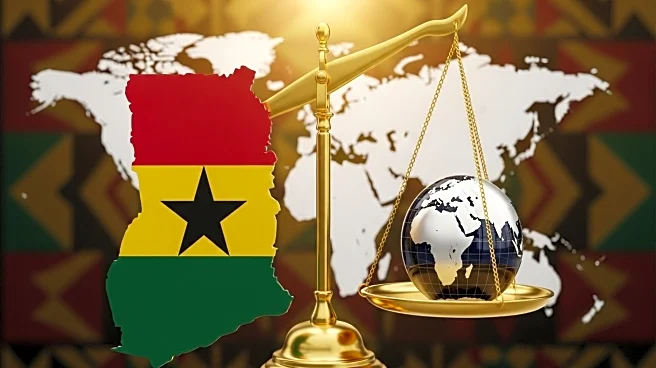What is the story about?
What's Happening?
The World Bank has issued a call for Ghana to adopt a more self-reliant approach to its economic policies, moving away from its historical dependence on International Monetary Fund (IMF) programs. In its latest Policy Notes titled 'Transforming Ghana in a Generation,' the World Bank emphasized the need for Ghana to implement bold reforms to achieve sustainable macroeconomic stability. The report highlights past governance failures characterized by fiscal indiscipline and inefficiency, which have led to repeated reliance on IMF-supported programs. The World Bank suggests that Ghana can achieve long-term economic transformation through fiscal discipline, sound governance, and structural reforms. The report also notes that Ghana could sustain growth above 6.5 percent and triple its per capita income by 2050 if it adopts bold policies and strengthens institutions.
Why It's Important?
The World Bank's advice is significant as it addresses the long-standing issue of Ghana's reliance on external financial assistance, particularly from the IMF. This reliance has often been criticized for its short-term focus, which does not align with the country's need for sustainable economic growth. By encouraging self-reliance, the World Bank is pushing Ghana towards a path of economic independence, which could lead to more stable and robust economic development. The potential benefits include increased investment in high-productivity sectors, improved human capital through better education and health systems, and enhanced social protection. These changes could position Ghana as a more competitive player in the global economy, reducing its vulnerability to external economic shocks.
What's Next?
Ghana is expected to consider the recommendations from the World Bank and potentially implement policy reforms that focus on fiscal discipline and structural changes. This may involve strengthening institutions and creating a more conducive business environment to attract investments. The government might also focus on diversifying its economy away from heavy dependence on natural resources. Stakeholders, including political leaders and economic planners, will likely engage in discussions to assess the feasibility and impact of these proposed reforms. The success of these initiatives will depend on the government's commitment to executing these changes and the support from international partners.
Beyond the Headlines
The World Bank's call for self-reliance could have deeper implications for Ghana's political and economic landscape. It may lead to a shift in how the country approaches international financial relationships, potentially reducing its dependency on external aid. This could foster a sense of national pride and ownership over economic policies, encouraging local innovation and entrepreneurship. Additionally, the focus on structural reforms and human capital development could lead to long-term cultural shifts, emphasizing education and health as key components of economic success.
















